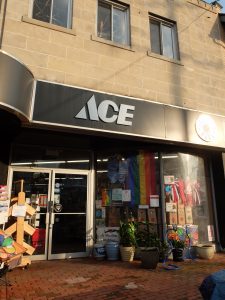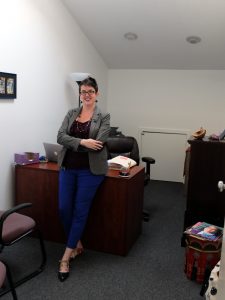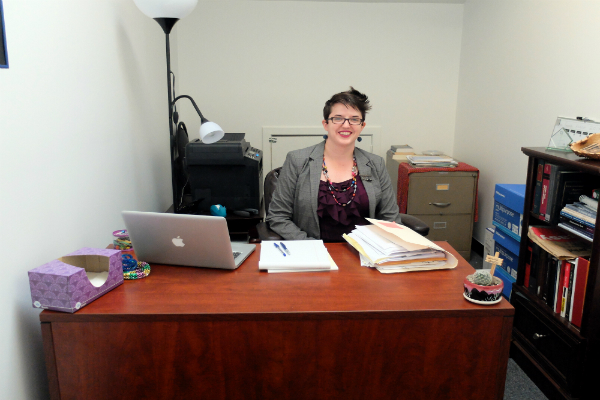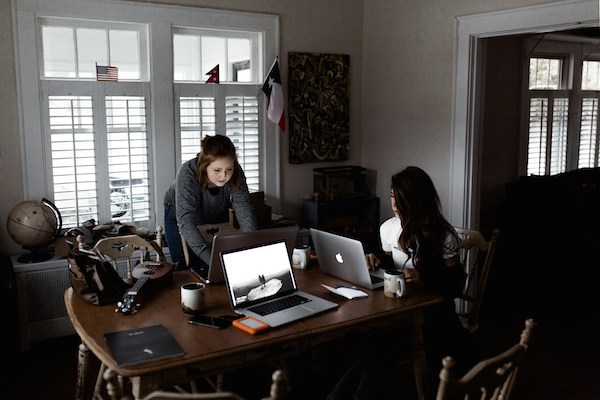
Tagg Team Thursdays: Courtney Ramsey
August 24, 2017
Wedding Announcement: Kinyatta Gray and Julie Murphy
August 28, 2017To reach Amanda Hackett’s law office, first walk through the Ace Hardware Store on Carroll Avenue in Takoma Park, Maryland, past the plants, bins, and paint samples. Follow signs to the Garden Center, and enter a small cluttered room. Pass through a door that might lead to a janitor’s closet. Ascend, descend, and ascend the Escher-esque stairs on the way to her office. Once you’re inside, Hackett, 33, who grew up on military bases in Indiana and Massachusetts, will turn the deadbolt on the door. Practical paranoia comes with the territory of LGBTQ asylum law.
In August 2014, Hackett was a recent graduate of Howard University School of Law and preparing for a trip. She was heading to Cleveland to play midfield in soccer at the International Gay Games. She’d been toying with the idea of starting her own practice when she walked by the Ace Hardware in Takoma Park and saw a simple sign in the window that had been there for months. It said, “Office space available. Call this number.” Hackett did and found the space to be small but a bargain. When she returned from the International Gay Games with a silver medal, she signed a lease for the space.
Hackett knew that above all, she needed her new office to be a sanctuary for her clients. “They come in and I ask them to tell me the worst things that ever happened to them, and I take notes about it,” she says. “So I needed to be able to create a space where they could cry.” So one of the first things she bought was a large purple box of tissues.

Her first LGBTQ asylum-seeking client came to her office four times before he was able to explain to her why, if he returned to his home country, he would be killed. It is illegal to be gay in over 80 countries, 10 of which regularly punish homosexuality with death. Besides these governments, violence can come from individuals’ families or neighbors.
If an LGBTQ-identifying asylum seeker can prove to the U.S. government that they will be persecuted if they returned to their country, then the U.S. will ostensibly grant them asylum, a new home here in America. Yet the process of compiling and presenting proof is a high-stakes, opaque bureaucratic maze. This is where asylum lawyers like Hackett come in.
Trust with her clients is paramount. “Having some shared experience with my clients is helpful,” Hackett says. She can tell a new client, “I haven’t lived your life, but I’ve lived a version of it here.” Having experienced homophobia herself in the United States—including an escape on foot from would-be attackers—it matters to her that she is helping her “people” when they’re are forced to flee their homes.
Hackett’s own community has played a critical role in her work. Her girlfriend was instrumental in urging her to become an immigration attorney, and her friends in immigration law have been ready with professional support and advice, from best practices to knowing whether to use a blue or green cover page in which circumstance. “You cannot start a business by yourself,” Hackett says. “Everything about my practice has been built on community.”

Three years since starting her practice, Hackett works mornings, nights, and weekends. She’s two years into learning Indonesian and closing in on fluency. But there’s not much free time, and since Trump took office, her clients—including some from now-banned countries—are fearful of the anti-immigrant mood in the White House. Despite how busy she is, there’s always the temptation to take another case. Hackett has to remind herself, “You want to see your girlfriend sometimes.”
In the meantime, she takes some solace in watching her clients grow more comfortable in the U.S. while they wait on a decision. She recalls a male client who entered her office and triumphantly announced, “I kissed a man on the street!”
“I’m so glad for you,” she replied. The moment still moves her. But she knows it may be years before they’ll know if he will be safe in the U.S. for good.





